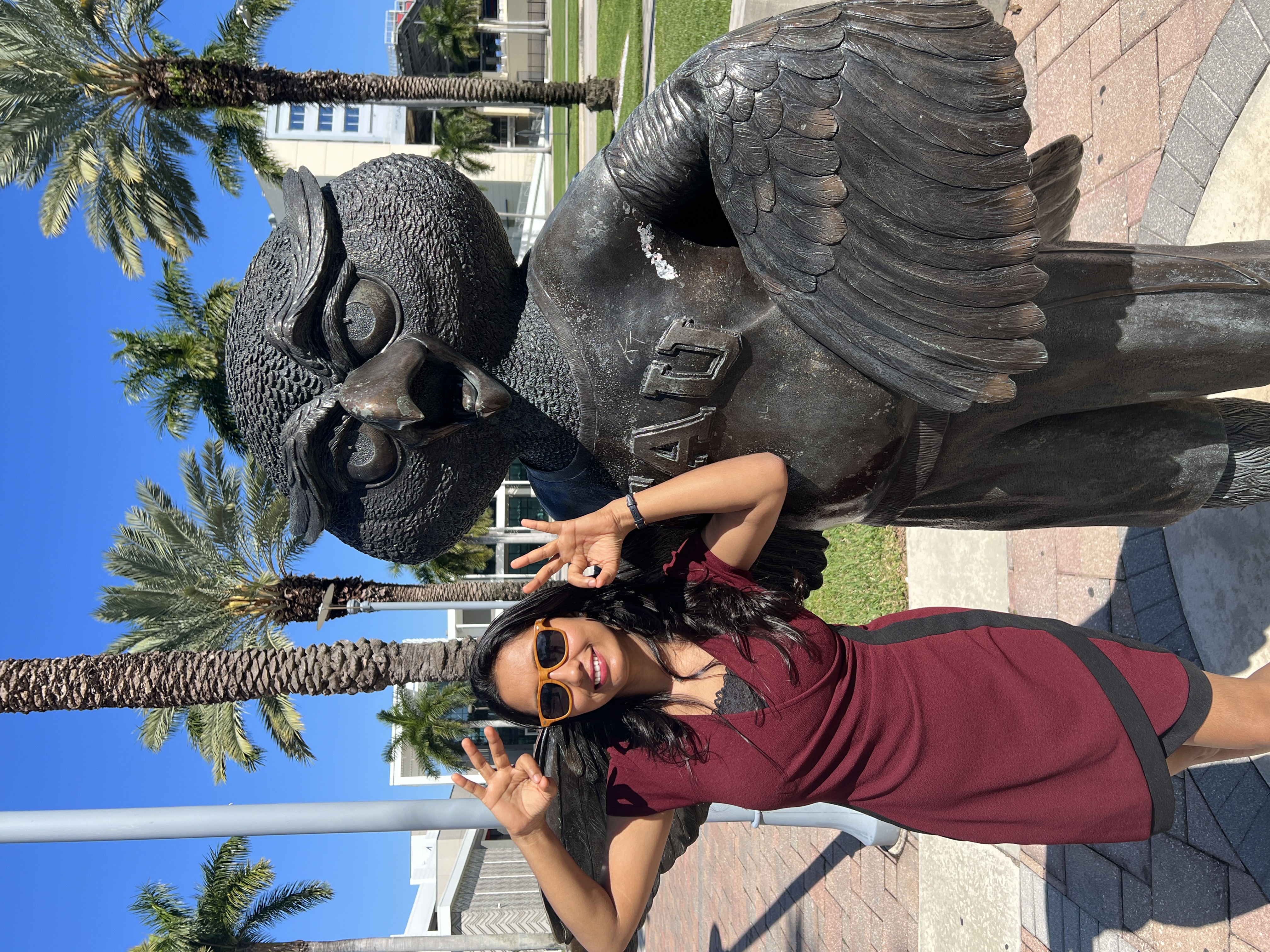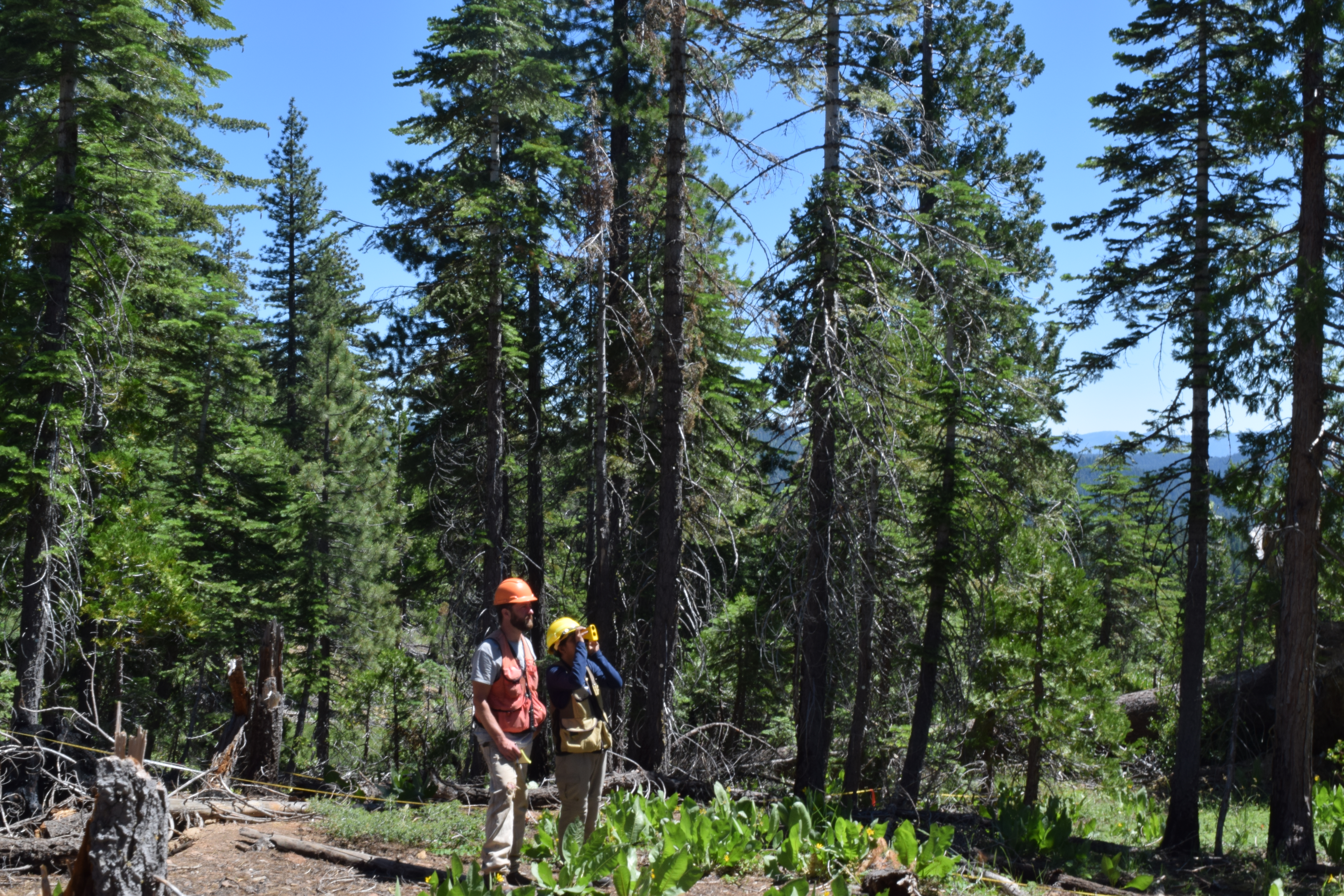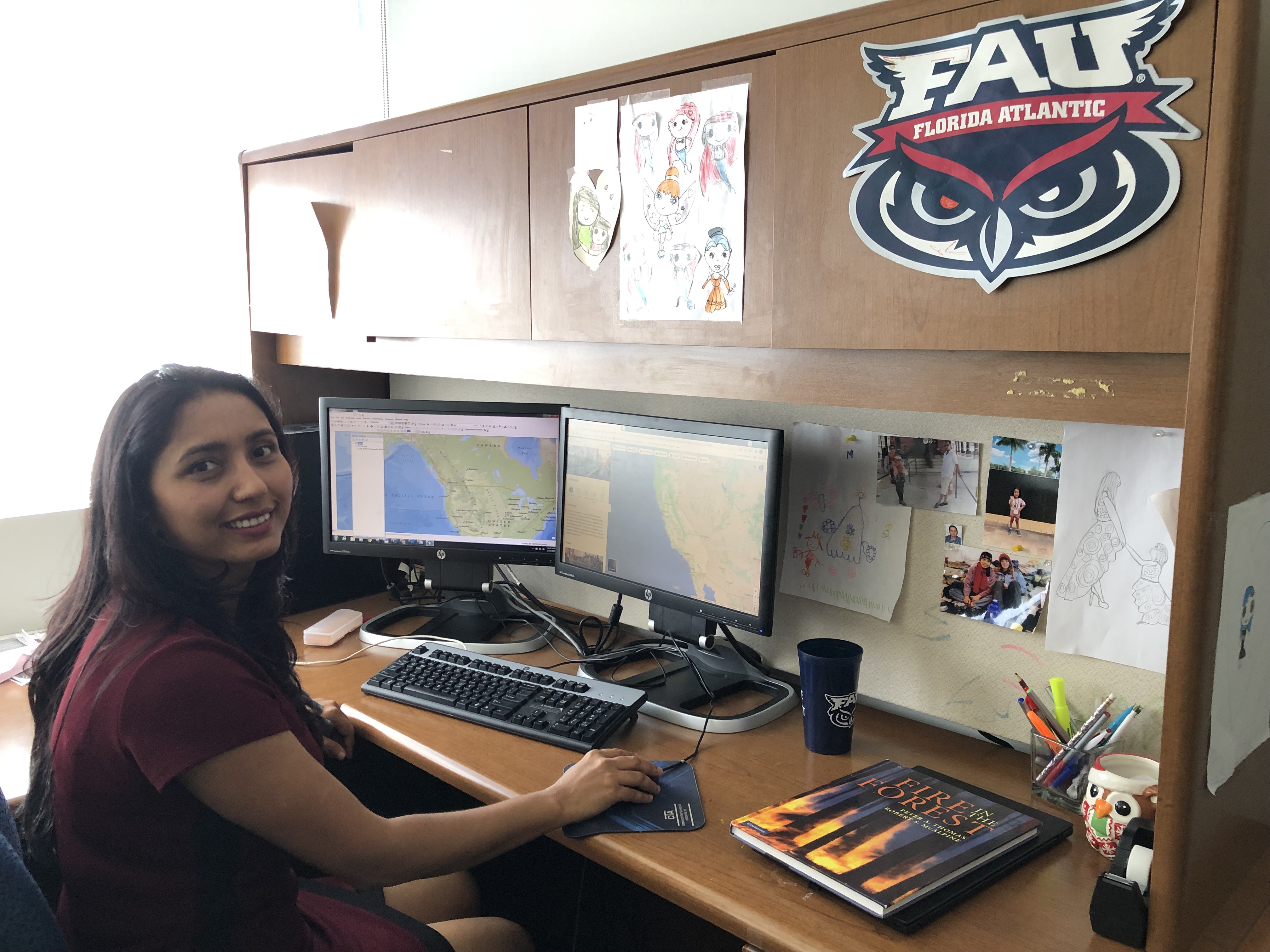Asha Paudel's Success Story
About Asha:

Asha Paudel is a native of Nepal which is bioculturally diverse country. She grew up in a small village in Nepal where educational opportunities are limited and challenging. Her parents did not have the opportunity to receive a formal education. She is proud to be the first generation university student in her family. In 2017, she came to FAU to pursue her PhD degree in the Department of Geosciences with Biogeography as her major, whereas Fire Ecology and Spatial Data Analysis as her minors. She won the Best Paper Presentation Award at the Florida Society of Geographer 2022 Annual Meeting on February 12, 2022. As a lead author, she has published the first chapter of her PhD research in the journal of Forest Ecology and Management. In appreciation of her academic excellence and involvement in extracurricular activities, she was awared International Student of the Year 2019. She is truely a representative of underrepresented women in STEM (Science, Technology, Engineering and Mathematics).Her passion is to conduct research on topics related to botany, biogeography, and conservation biology. Nature photography, cooking, and gardening are three of her favorite pastimes.
"Asha has worked tirelessly on her novel and demanding dissertation research. She spent two hard summer field seasons in the Sierra Nevada range in California collecting data for a chapter of her dissertation that was just accepted in the journal Forest Ecology and Management. She has logged many hours on the computer learning and using new data processing and statistical methods, GIS and remote sensing, spatial data analysis, and spatial Monte Carlo simulation modeling. Despite challenges and temporary setbacks, she has always been flexible, pushed forward, and worked with collaborators to get the information or assistance she needed to produce high quality research.
Asha brought new ideas to our research concerning cultural and communal practices for forest management in Nepal that have been lost from the government agency-based management paradigm in the United States. Those intellectual contributions resulted in an article published in the Canadian Journal of Forest Research using practices from less developed countries as proxies for estimating the impacts Native Peoples in the US may have had on forest fuel loads and fire regimes prior to contact with Europeans," - Dr. Scott H. Markwith, professor and academic advisor at the Department of Geosciences.
Questions about being an International Student:
Why did you choose FAU? What do you like about FAU the most?
For three reasons, I decided to become an OWL. For starters, I was offered a research assistantship in fire ecology, which is my field of interest. Second, I was astounded to learn that it is one of the country's most culturally and ethnically diverse colleges, which made me feel more accepted. Third, I was amazed by the location, which is so near to the ocean. FAU is in a beautiful position, and I could simply cycle to the beach for recreation because I am from a landlocked nation and had never seen the ocean before. I really enjoy the surrounding vegetation, particularly the palm trees and majestic fig trees that encircle the school.
What is the most exciting part about being an international student?
Getting to know people from different places and cultures is the most intriguing aspect. Making friends with them allows you to learn about new foods, traditions, languages, and much more; it's like going on a trip to their nation without having to leave the country. I was brought up in a patriarchal environment where women's voices are rarely heard and they are excluded from decision-making processes. It was amazing for me to observe how everyone is treated equally and freely here, regardless of gender.
What has been your biggest challenge as an international student? How did you respond to orovercome that challenge?
First, my foreign accent was a major challenge, making it difficult to understand people and for them to understand me at times. Therefore, I consulted my roommate at that time, Catrin, who is a linguist. We had accent-reduction sessions, which included slower pronunciation, listening, and repeating certain words, and pay more attention to specific sequence of sounds; all of which improved my accent. I've grown accustomed to the local dialect now. In the California Forest Service barracks, being surrounded by native speakers also helped a lot. My friends and supervisor deserve credit for not passing judgment on me and supporting me in improving my accent.
Second, I had never driven a car before. Everyone over here learns to drive when they are 16 or 17 years old. I rode my bike to school for three years, picking up and dropping off my daughter at school, and even to the grocery store, and I was regularly caught in the rain with my five-year-old daughter. However, I overcome this barrier and learned driving which made me feel so independent now.
How does your international background benefit your study and research at FAU?
As an international student from Nepal who is also a woman of color, I represented FAU by working with the diverse research team to collect vegetation and fuel data in the Sierra Nevada mountains for two summers in 2017 and 2018. With expertise in botany, applied ecology, and geography, I contributed varied study views from Nepal's Himalaya to my research team in California. My coworkers admired my plant identification skills and expertise, which motivated me to do better. The difficulties I encountered transitioning to a new culture and environment, as well as the decision-making skills I gained, made me more independent and empowered, enhancing my ability to overcome any obstacles in my own research and study at FAU.
What is your advice for international students who are starting at FAU?
I'd like them to be honest about their concerns and challenges. They should always remember that they are not alone and that every difficulty has a solution. I advise them to participate in any events involving international students. They will be able to take advantage of the international office's on-campus resources.
Quote that motivates you the most?
"What you think, you become," is a statement that has motivated me. You attract what you feel. "You create what you conceive." Gautam Buddha
Questions about your Research:

What is your research focus?
Biogeography, vegetation dynamics, restoration, disturbance ecology, and landscape ecology are among my research interests, with a focus on changes in plant populations and communities in connection to ecological processes, climate change, and human activities.
How did you get involved in research?
I first became involved in research as a volunteer with the Global Observation Research Initiatives in Alpine Environment, or GLORIA, an international climate change research team that allowed me to explore applied ecological research relating to vegetation dynamics in relation to ecological processes and human activities.
During my fieldwork in the Himalaya, I came across patches of burned shrublands of socioeconomic importance and got fascinated about how this post-fire vegetation would relate to local people's livelihood. I took up this topic for my Masters’ thesis.
In 2021, I published an important article from my Masters’ dissertation on alpine shrubland fire, in the very renowned peer-reviewed journal ‘International Journal of Wildfire’.
In my PhD dissertation, I'm looking at vegetation dynamics in a dry conifer forest in the northern Sierra Nevada, California, in relation to frequent wildfires. The first part of my PhD research, which was based on field data, was recently published in Forest Ecology and Management, a peer-reviewed journal. The other two sections are based on secondary data from satellites and employ ArcGIS and programming.
Aside from fire ecology research, I'm also working on a project with researchers from Monash University in Australia and Tribhuvan University in Nepal to explore flora and plant-pollinator interactions in Nepal's Himalaya.
What does research mean to you?
My passion is research. It's a way of figuring out how global change affects natural systems and people's lives. It's a method for knowledge advancement.
How has research benefited you or others?
As a researcher, I'm more confident in my abilities. The findings of my fire ecology research in two different environments, alpine meadows in Nepal's Himalaya and mixed conifer forest in California's Sierra Nevada, provide insight into vegetation pattern changes caused by fire under current climate change scenarios, allowing management activities to be suggested. As a result, it benefits both me and the environment, as well as society as a whole.
Fun Questions:

What is your favorite spot at FAU campus?
Brezeway, Library, Fig trees sitting spots.
Where do you want to travel in the U.S./ Where have you already travelled to?
I've done fieldwork in some wonderful places in the US, including California, and I still enjoy traveling there. Other locales include the Smoky Mountains, Tennessee, Colorado, Wisconsin, New York, Washington, D.C., Pennsylvania, Georgia, and North Carolina. I'd like to see everything I can. Wyoming, Yellowstone National Park, and Tucson, Arizona, on the other hand, are places I'd like to visit.
Recommend a favorite book/movie/local restaurant?
My favorite book is “Letter to young scientist” E. O Wilson.
Favorite movie is Avatar.
Because I am a vegetarian, I like to eat plant-based foods. True Food, Bolay, Wholefoods, and more similar brands are available.